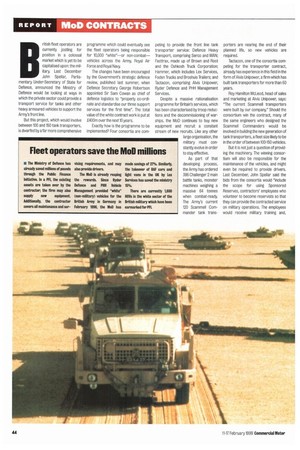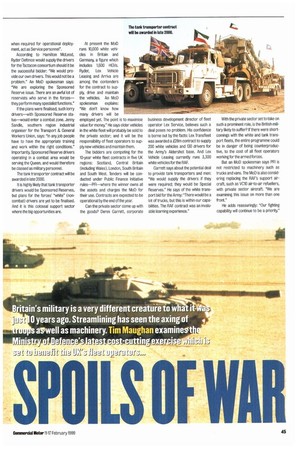ritish fleet operators are currently jostling for position in a
Page 46

Page 47

If you've noticed an error in this article please click here to report it so we can fix it.
colossal market which is yet to be capitalised upon: the military. Last December John Speller, Parliamentary Under-Secretary of State for Defence, announced the Ministry of Defence would be looking at ways in which the private sector could provide a transport service for tanks and other heavy armoured vehicles to support the Army's front line.
But this project, which would involve between 100 and 150 tank transporters, is dwarfed by a far more comprehensive programme which could eventually see the fleet operators being responsible for 10,000 "white"—or non-combatvehicles across the Army, Royal Air Force and Royal Navy The changes have been encouraged by the Government's strategic defence review, published last summer, when Defence Secretary George Robertson appointed Sir Sam Cowan as chief of defence logistics to "properly co-ordinate and standardise our three support services for the first time". The total value of the white contract work is put at £400m over the next 10 years.
Exactly how is the programme to be implemented? Four consortia are corn
peting to provide the front line tank transporter service: Defence Heavy Transport, comprising Serco and MAN; Fasttrax, made up of Brown and Root and the Oshkosh Truck Corporation; Hammer, which includes Lex Services, Foden Trucks and Broshuis Trailers; and Tactacon, comprising Alvis Unipower, Ryder Defence and PHH Management Services.
Despite a massive rationalisation programme for Britain's services, which has been characterised by troop reductions and the decommissioning of warships, the MoD continues to buy new equipment and recruit a constant stream of new recruits. Like any other large organisation, the military must constantly evolve in order to stay effective.
As part of that developing process, the Army has ordered 386 Challenger 2 main battle tanks, monster machines weighing a massive 64 tonnes when combat-ready. The Army's current 120 Scammell Commander tank trans
porters are nearing the end of their planned life, so new vehicles are required.
Tactacon, one of the consortia competing for the transporter contract, already has experience in this field in the form of Alvis Unipower, a firm which has built tank transporters for more than 60 years.
Roy Hamilton McLeod, head of sales and marketing at Alvis Unipower, says: "The current Scammell transporters were built by our company." Should the consortium win the contract, many of the same engineers who designed the Scammell Commanders would be involved in building the new generation of tank transporters, a fleet size likely to be in the order of between 100-150 vehicles.
But it is not just a question of providing the machinery. The winning consortium will also be responsible for the maintenance of the vehicles, and might even be required to provide drivers. Last December, John Spellar said the bids from the consortia would "include the scope for using Sponsored Reserves, contractors' employees who volunteer to become reservists so that they can provide the contracted service on military operations. The employees would receive military training and, when required for operational deployment, act as Service personnel".
According to Hamilton McLeod, Ryder Defence would supply the drivers for the Tactacon consortium should it be the successful bidder: "We would provide our own drivers. This would not be a problem." An MoD spokesman says: "We are exploring the Sponsored Reserve issue. There are an awful lot of reservists who serve in the forces— they perform many specialist functions."
lithe pians were finalised, such lorry drivers—with Sponsored Reserve status—would enter a combat zone. Jenny Sandie, southern region industrial organiser for the Transport & General Workers Union, says: "In any job people have to have the appropriate training and work within the right conditions." Importantly, Sponsored Reserve drivers operating in a combat area would be serving the Queen, and would therefore be classed as military personnel.
The tank transporter contract will be awarded in late 2000.
It is highly likely that tank transporter drivers would be Sponsored Reserves, but plans for the forces' "white" (noncombat) drivers are yet to be finalised. And it is this colossal support sector where the big opportunities are. At present the MoD runs 10,000 white vehicles in Britain and Germany, a figure which includes 1,600 HGVs. Ryder, Lex Vehicle Leasing and Arriva are among the contenders for the contract to supply, drive and maintain the vehicles. An MoD spokesman explains: "We don't know how many drivers will be employed yet. The point is to maximise value for money" He says older vehicles in the white fleet will probably be sold to the private sector; and it will be the responsibility of fleet operators to supply new vehicles and maintain them.
The bidders are competing for the 10-year white fleet contracts in five UK regions: Scotland, Central Britain (including Wales), London, South Britain and South West. Tenders will be conducted under Public Finance Initiative rules—PFI—where the winner owns all the assets and charges the MoD for their use. Contracts are expected to he operational by the end of the year.
Can the private sector come up with the goods? Derek Garrett, corporate business development director of fleet operator Lex Service, believes such a deal poses no problem. His confidence is borne out by the facts: Lex Transfleet was awarded a £28m contract to supply 200 white vehicles and 130 drivers for the Army's Aldershot base. And Lex Vehicle Leasing currently runs 3,300 white vehicles for the RAE Garrett says about the potential deal to provide tank transporters and men: "We would supply the drivers if they were required; they would be Special Reserves." He says of the white transport bid for the Army: 'There would be a lot of trucks, but this is within our capabilities. The RAF contract was an invaluable learning experience." With the private sector set to take on such a prominent role, is the British military likely to suffer? If there were shortcomings with the white and tank transport fleets, the entire programme could be in danger of being counterproductive, to the cost of all fleet operators working for the armed forces.
But an MoD spokesman says PFI is not restricted to machinery such as trucks and vans. The MoD is also considering replacing the RAF's support aircraft, such as VC10 air-to-air refuellers, with private sector aircraft. "We are examining this issue on more than one front."
He adds reassuringly: "Our fighting capability will continue to be a priority."




































































































